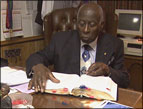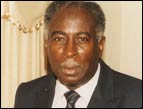interview
Thomas Linton: Living Saint of Civil Rights History
By Mia Evans
The 700 Club
CBN.com
– Thomas Linton’s barber shop is a permanent fixture on T.Y. Rogers Avenue in downtown Tuscaloosa, Alabama.
“I've had people, I've been cutting their hair since 1951 and I'm still cutting their hair,” Thomas said. "And I just enjoy meeting with people and talking with people.”
At 79, Thomas is not only a barber, but the pastor of the church he founded more than 20 years ago. To him, ministry has never been confined to a church building
“Many times I've had people led to Christ right here in the shop,” he said. “If you just listen to people talk, their conversation; just sit and listen, they open a door for you to present Jesus Christ. You don't have to try and open the door for them. They'll open a door in their conversation.”

His barber shop is a living museum. A glance across the walls tells the story of when Tuscaloosa was a different place all together.
“There was certain places you couldn't go and certain things you couldn't say. And that's the way it was every where," Thomas said. "It wasn't just here. It was everywhere; even though I grew up around white kids and we played together. Downtown and everything was segregated. If they had a restroom, it [the one for African Americans] was downstairs. If they had a drinking fountain it said ‘colored.’ Everything was white only. They’d let you know where you were and what you could do. That’s just the way it was. You could not go in a place to eat; you could not go in there. They'd always have a side place, if they'd serve you. And they would get to you when they got ready, when there wasn't anything else to do.”
Racial tensions mounted during the civil rights movement of the 50s and 60s. A bitter clash in Tuscaloosa, just steps from Thomas’ shop, made national headlines.
On June 9, 1964, the pews at First African Baptist Church were filled with African American demonstrators who were organizing a peaceful protest. But police stopped their plans with tear gas and night sticks. These were the turbulent times Reverend Thomas Linton was living in.
"Many times I had guards around my house guarding my house at night because it got quite dangerous," Thomas said. "So you had white people riding around looking for people, looking for us. There was some fear, but not enough to stop us from doing what had to be done."
Change came about very slowly, but Thomas’s determination to make a difference didn’t waiver.
“We had a whole lot of neighborhood grocery stores all over town, but there was no black cashiers. So my job was, when we got started, was to try to talk to people about hiring,” Thomas said. “Most of the customers were black. Hiring a black cashier - and they refused to do it. So what we'd do, we'd boycott."
Boycotting eventually lead to a civil rights victory. And Thomas negotiated the hiring of many African Americans workers in Alabama.
"It was my job, because they trusted me to hire. And they would hire whoever I sent." Thomas said. "I even hired for the state unemployment office."
In the 1960s, rioting broke out across the country. Local city officials looked to Thomas for a way to prevent an outburst in Tuscaloosa.
“The police picked me up at home at 12 o'clock midnight. We met at midnight and I gave them a plan where I can save this city - keep the young people from getting stirred, burnings, destroying stuff,” Thomas said. “And they said, ‘how?’”
“And I said, ‘give them a job.’”
“He said, ‘Don't nobody want to work.’”
“I said, ‘You trust me.’”

“They said, ‘ok.’ They didn't think I could do it,” Thomas said. “That Monday, I had over a 100 boys up there. That Tuesday, I had over 100. That Wednesday, I had so many downtown on Broad Street; I had so many they were standing out in the street.”
Thomas’ hiring strategy opened doors for people in his hometown and brought jobs to hundreds of African American students across the county. People still come up to Thomas today thanking him for giving them a job. He told about one recent encounter.
“She said, ‘I want to thank you again for giving me that job. So I want to tell you one thing - I'm retiring - after 35 years. It was 35 years ago. After 35 years I'm going to retire. But I want to thank you.’ I'll never forget,” Thomas said, “I told her, ‘You can't retire until I tell you to retire. Because I hired you, I have to fire you [laughing].”
Reverend Thomas Linton will most likely continue to run his barber shop and live out the rest of his days in Tuscaloosa. His wife is buried here in a segregated cemetery - a reminder of past prejudices. Thomas has since remarried and found peace in the present.
“You have to forgive people. You can’t be angry,” Thomas said. “You have to think about what Jesus Christ did for me. Of all the things I've done, He forgave me. I live for Christ. I accepted Him and He said, ‘Whom the Son set free is free.’ And I know what it means to be free, free from being angry, free from being worried; even though a lot of times I'm tempted. But I have to know what my mission is, my job is. So I cannot allow that to get in my way.”
“I have no plans of retiring. It's not part of my agenda; just looking for greater things that I can do.,” Thomas said. “As the Lord gives me strength to do what He called me to do, I'm willing to do it.”
CBN IS HERE FOR YOU!
Are you seeking answers in life? Are you hurting?
Are you facing a difficult situation?
A caring friend will be there to pray with you in your time of need.
